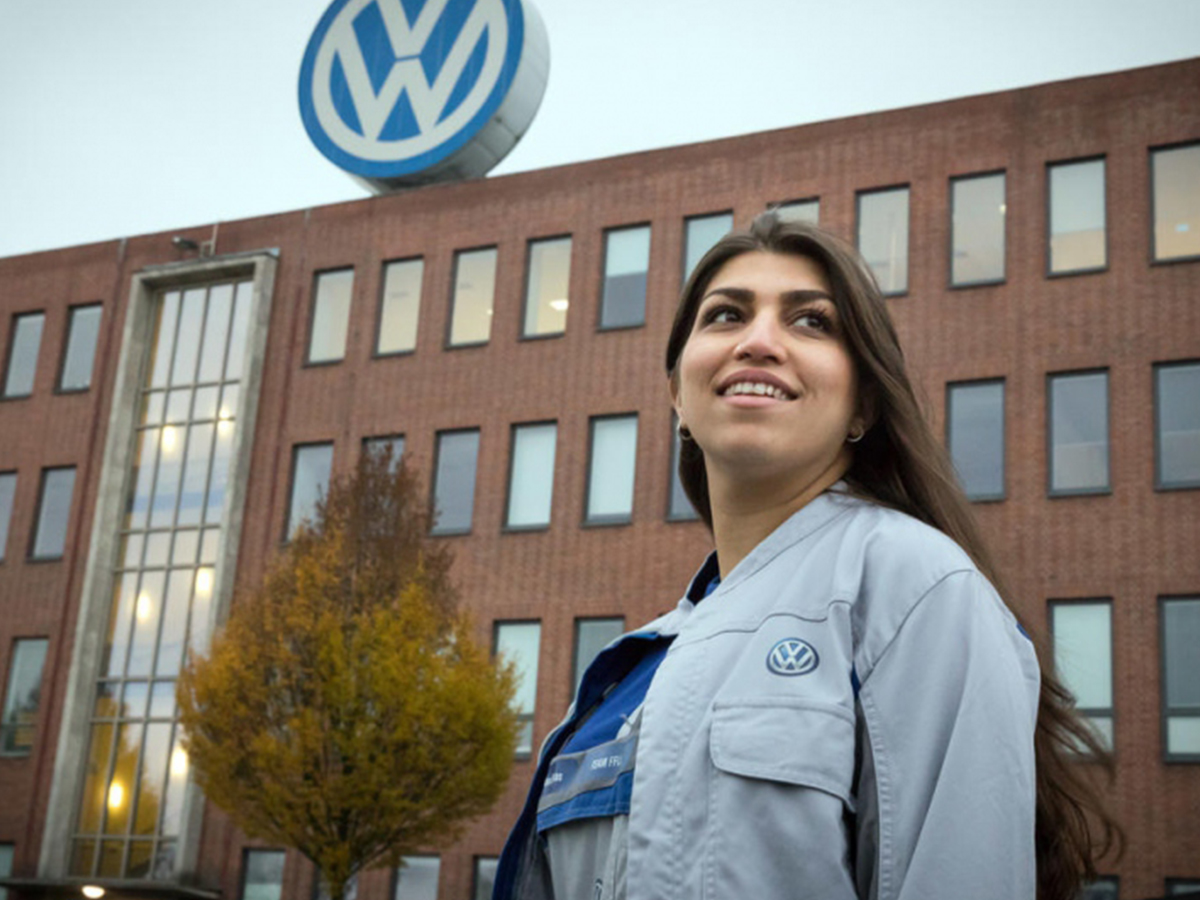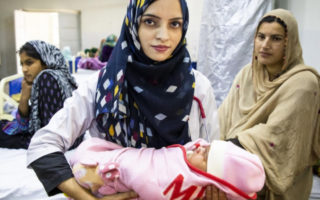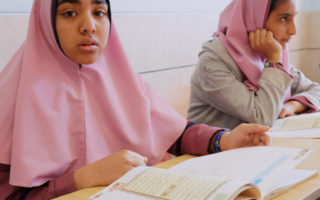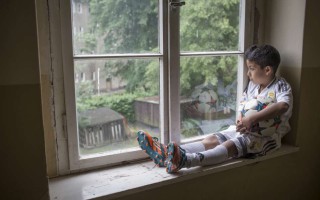
Mastura, a refugee from Afghanistan, stands in front of Volkswagen’s big plant and logistics centre in Baunatal, Germany. © UNHCR/Gordon Welters
A programme by Volkswagen offers refugees a path to a permanent job at the world’s largest auto maker.
When Volkswagen – the world’s largest automaker – offered Mastura Ekhlas a place on a programme that could lead to a permanent job, she knew it was the chance of a lifetime.
She had arrived in Germany in 2013 as a refugee from Afghanistan. Soon afterwards, she gave birth to her third child while living in a shelter for asylum seekers. It was a tough time.
“It was so difficult at first, starting from zero,” said Mastura. “But I knew in my heart that I just had to push on. I put all my strength into getting something more secure.”
Mastura’s family found an apartment in Baunatal, not far from the VW Kassel plant in central Germany. She mastered German and found work in a shop and a pharmacy. But she dreamed of a job that would offer her family stability.
“I worked like a man, believe me.”
“I used to go past the VW plant, look up at the sign, and wonder,” she said. She enquired at the job centre and found VW had a year-long qualification programme for refugees at its huge plant and logistics centre in Baunatal. Once she was accepted, she gave everything to impress her superiors.
“I worked like a man, believe me,” she said. “The men would say, ‘Mastura, you don’t have to lift that package,’” she said. “But … I wanted to show everyone I could do it, too. I knew I had to grow and learn if I was going to achieve something here in Germany.”
Her determination speaks to the desire of refugees for a better future. It also shows the value of such programmes for refugees offered by companies such as VW. These opportunities help fill gaps in Germany’s labour force, but they can also change lives.
VW’s programme started in 2017. Its entry qualification couples a traditional programme with extra language tuition to help newcomers find their feet in the German workplace.
At the Global Refugee Forum in Geneva on 17-18 December, states, the private sector and others will announce high-impact contributions. These aim to reduce refugee dependence on aid, give them a chance to use and enhance their skills and also to contribute to host country economies.
The Forum will showcase the VW programme because it exemplifies how integration enables refugees to lead productive lives in host countries.
Mistura’s hard graft paid off. Last month, she began a two-year programme with VW to become a specialist for warehouse logistics. At the end, a permanent job beckons.
“The program is a great example of how integration can work.”
“We wanted to give refugees longer term prospects,” says Stefan Kreher, Director of Human Resources at VW Kassel, who launched the scheme in consultation with the German employment agency and the wider VW Group.
“The program is a great example of how integration can work,” he said. “There’s a demand for skilled workers in the logistics branch in this region, so it’s a win-win situation for all.”
The programme has a track record. Most participants go on to traineeships or jobs with VW or other logistics operators in the region. A key element is the extra language tuition and support for those who are retraining.
“We started from scratch here in Germany with no language, so we need to try very hard to pass exams,” said Syrian trainee Mohammad Al Jaser. “But I’m motivated, and I think I can do it.”
When he arrived in Germany in 2015, he hoped to continue his career as an IT specialist but he realised the language barrier meant he needed to re-train. He completed the programme at VW before landing a sought-after training contract. Now in his second year, Mohammad is on track to pass his exams and become a permanent employee.
“When I arrived, I didn’t want to sit around waiting in the shelter, I wanted to … do something. Now I’m paying taxes in Germany, and my neighbours are proud of me,” says Mohammad, who with his stipend helps support his wife and 18-month-old daughter.
For trainees like Mohammad and Mastura, career prospects can mean more than just having an income, says Ariane Kilian, Head of VW Group Refugee Aid, which was founded during the peak of arrivals in 2015. VW says it has since helped 5,000 refugees across its sites.
“We made a long-term commitment, and today the focus is on education and encounters, because we want to help refugees move towards landing a traineeship or job in Germany,” says Kilian.
That’s because the refugees find work, the faster they can provide for their families’ basic needs and look forward to a future as productive members of society.
“All of this hard work is for my children’s future,” says Mastura. “That’s enough for me, that my kids know I’m achieving something. It’s so important for us that I have stable work in Germany. This country has become like home.”
Originally published by UNHCR on 12 December 2019





